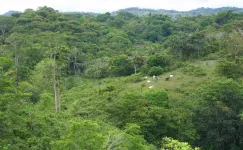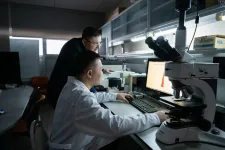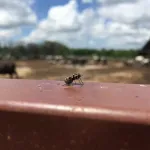INFORMATION:
Analysis of "virtual" pollinator trade reveals global dependence on biodiversity for food consumption
Virtual pollination trade uncovers global dependence on biodiversity of developing countries
2021-03-10
(Press-News.org) By analyzing more than a decade's worth of information on 55 crops, all dependent on pollinators, scientists have revealed that developed countries are particularly reliant on imported pollinator-dependent crops, while countries that export the majority of these crop types are major drivers of pollinator declines. Their assessment of the "virtual" exchange of pollinator services in the global food trade could help governments and agencies form new policies to preserve crop diversity and tackle biodiversity loss. In today's globalized world, human food consumption largely depends on the trade of crops and the intense use of resources such as water and land. Pollinators such as bees, and the pollinations services they provide, are an invaluable resource in agriculture; one study estimated that 75% of crops and 35% of crop production require pollination services. As pollinating species decline globally from environmental degradation, researchers have sought to identify regions where protecting biodiversity will best preserve pollinators and crop quality and production. Here, Felipe da Silva e Silva and colleagues applied the concept of "virtual resource flow" to study pollination as a traded resource, examining how crop-boosting services from wild pollinators in crop-exporting countries transfer to international markets. They analyzed data from 55 pollinator-dependent crop markets from 2001 to 2015 and compared how developing and developed countries relied on pollination services. The authors saw that developed countries relied heavily on imported, pollinator-dependent crops to sustain their food consumption, suggesting these countries "virtually" import pollination services from other nations that depend on biodiversity to sustain pollination. Furthermore, countries that exported the most pollinator-dependent crops also showed the fastest rates of cropland expansion - a major driver of pollinator and biodiversity decline - hinting that exporting countries also remain vulnerable to biodiversity loss. Silva et al. also developed an online tool that catalogues the virtual pollination trade across countries, which can be accessed here.
ELSE PRESS RELEASES FROM THIS DATE:
Where am I going? Just ask your subiculum
2021-03-10
OSAKA, Japan - The hippocampus is the part of the brain that deals with information associated with spatial navigation and memory. For example, you are driving and despite the changing environment of different cars going at varying speeds, on and off ramps, distracting billboards, etc., you adjust your speed, glance only momentarily at the billboards, and navigate the roads in a smooth and timely manner. This is your hippocampus at work. It takes the input - a continuously changing environment - and helps turn it into the output - using memory of a road map to safely navigate your way. However, little is known about how information is distributed from the hippocampus to other brain regions that results in the output behaviour.
A research team led by Lecturer Takuma Kitanishi and Professor ...
Outbreak of a rare, polio-like syndrome likely prevented, postponed by social distancing
2021-03-10
Social distancing not only helped slow the spread of COVID-19 -- it also may have prevented the transmission of an outbreak of a rare polio-like syndrome, according to Princeton University researchers.
Though uncommon, acute flaccid myelitis (AFM) is a critical spinal condition that causes weakness in the limbs, seriously diminishes motor function, and can lead to lifelong disabilities. The syndrome was first reported in the United States in 2012 and has been coming back every two years, hinting it could strike again in 2020.
Using epidemiological surveillance tools, the researchers showed that an AFM outbreak was ...
Epidemiological model links spread of respiratory virus to a rare, paralyzing disease
2021-03-10
Harnessing a predictive algorithm, Sang Woo Park and colleagues have mapped out new trends in the incidence of the respiratory virus enterovirus D68 in the U.S. since 2014. Their epidemiological study supports research that has linked enterovirus D68 to acute flaccid myelitis (AFM), a rare and mysterious paralyzing disease, and addresses critical gaps in knowledge of how enterovirus D68 has been spreading in the U.S. The analysis also suggests that social distancing interventions during the COVID-19 pandemic likely lowered the prevalence of AFM in 2020. Cases of the polio-like illness AFM, which rapidly results in ...
Adolescents and young adults may be more susceptible to COVID-19 than previously believed
2021-03-10
Adolescents and young adults may be more susceptible to COVID-19 than previously believed, according to analysis of cases in six U.S. states experiencing surges.
INFORMATION:
Article Title: Prevalence of COVID-19 in adolescents and youth compared with older adults in states experiencing surges
Funding: The authors received no specific funding for this work.
Competing Interests: The authors have declared no competing interests exist.
Article URL: https://journals.plos.org/plosone/article?id=10.1371/journal.pone.0242587
...
People's trust levels predict willingness to engage in COVID-19 control behaviors
2021-03-10
Individuals' willingness to engage in COVID-19 control measures is associated with their trust in the government, other citizens, and in particular science, according to a new study published this week in the open-access journal PLOS ONE by Stefano Pagliaro of University of Chieti-Pescara, Italy, and colleagues.
The spread of SARS-CoV-2 since December 2019 has posed a severe public health threat to people around the world. As vaccines are being rolled out, behavioral changes are also necessary to counter the spread of the virus. These actions include both prescribed behaviors such as wearing masks, social distancing, and quarantining, as well as discretionary prosocial behaviors like donating to charities ...
Researchers solve more of the mystery of Laos megalithic jars
2021-03-10
New research conducted at the UNESCO World Heritage listed 'Plain of Jars' in Laos has established the stone jars were likely placed in their final resting position from as early as 1240 to 660 BCE.
Sediment samples from beneath stone jars from two of the more than 120 recorded megalithic sites were obtained by a team led Dr Louise Shewan from the University of Melbourne, Associate Professor Dougald O'Reilly from the Australian National University (ANU) and Dr Thonglith Luangkoth from the Lao Department of Heritage.
The samples were analysed using a technique called Optically Stimulated Luminescence (OSL) to determine when sediment grains were ...
In Panama, nitrogen-fixing trees unlock phosphorus and other scarce nutrients
2021-03-10
A new study, published this week in Proceedings of the National Academy of Sciences, reveals that nitrogen-fixing trees play an underrecognized role in recovering tropical forests by enriching nutrient-poor soils with scarce elements such as phosphorus and molybdenum.
Coauthor Sarah Batterman, a tropical forest ecologist at END ...
Research reveals oldest documented site of indiscriminate mass killing
2021-03-10
In previous research, ancient massacre sites found men who died while pitted in battle or discovered executions of targeted families. At other sites, evidence showed killing of members of a migrant community in conflict with previously established communities, and even murders of those who were part of religious rituals.
But a more recent discovery by a research team -- that includes two University of Wyoming faculty members -- reveals the oldest documented site of an indiscriminate mass killing 6,200 years ago in what is now Potocani, Croatia.
"The DNA, combined with the archaeological and skeletal evidence -- especially that ...
Scientists develop new magnetic nanomaterial for ?ounterfeit money prevention
2021-03-10
An international research team led by NUST MISIS has developed a new iron-cobalt-nickel nanocomposite with tunable magnetic properties. The nanocomposite could be used to protect money and securities from counterfeiting. The study was published in Nanomaterials.
Presently, research on magnetic nanomaterials with controlled magnetic characteristics is one of the most promising fields. Due to their small size, as well as their excellent magnetic and electric properties these materials have a broad range of potential applications from mobile devices to space technologies.
The new iron-cobalt-nickel nanocomposite was obtained by chemical precipitation, followed by a reduction process.
"This ...
Forget the fly swatter: Biologists map genes to fight stable flies
2021-03-10
Researchers hope to use an agricultural pest's genetic code against it to prevent billions of dollars in annual losses in the United States.
Stable flies, or Stomoxys calcitrans, are spotted, tan-colored flies found around the world. They are easily mistaken for the common housefly but for one notable distinction: They bite.
"If you get one in your house and it bites you, it's a stable fly," said Joshua Benoit, an assistant professor of biology at the University of Cincinnati.
Stable flies don't bite so much as chomp. They are the scourge of beachgoers in Florida and recreational boaters in upstate New York. According to Thomas Jefferson, they tormented signatories ...
LAST 30 PRESS RELEASES:
GLP-1 drugs associated with reduced need for emergency care for migraine
New knowledge on heritability paves the way for better treatment of people with chronic inflammatory bowel disease
Under the Lens: Microbiologists Nicola Holden and Gil Domingue weigh in on the raw milk debate
Science reveals why you can’t resist a snack – even when you’re full
Kidney cancer study finds belzutifan plus pembrolizumab post-surgery helps patients at high risk for relapse stay cancer-free longer
Alkali cation effects in electrochemical carbon dioxide reduction
Test platforms for charging wireless cars now fit on a bench
$3 million NIH grant funds national study of Medicare Advantage’s benefit expansion into social supports
Amplified Sciences achieves CAP accreditation for cutting-edge diagnostic lab
Fred Hutch announces 12 recipients of the annual Harold M. Weintraub Graduate Student Award
Native forest litter helps rebuild soil life in post-mining landscapes
Mountain soils in arid regions may emit more greenhouse gas as climate shifts, new study finds
Pairing biochar with other soil amendments could unlock stronger gains in soil health
Why do we get a skip in our step when we’re happy? Thank dopamine
UC Irvine scientists uncover cellular mechanism behind muscle repair
Platform to map living brain noninvasively takes next big step
Stress-testing the Cascadia Subduction Zone reveals variability that could impact how earthquakes spread
We may be underestimating the true carbon cost of northern wildfires
Blood test predicts which bladder cancer patients may safely skip surgery
Kennesaw State's Vijay Anand honored as National Academy of Inventors Senior Member
Recovery from whaling reveals the role of age in Humpback reproduction
Can the canny tick help prevent disease like MS and cancer?
Newcomer children show lower rates of emergency department use for non‑urgent conditions, study finds
Cognitive and neuropsychiatric function in former American football players
From trash to climate tech: rubber gloves find new life as carbon capturers materials
A step towards needed treatments for hantaviruses in new molecular map
Boys are more motivated, while girls are more compassionate?
Study identifies opposing roles for IL6 and IL6R in long-term mortality
AI accurately spots medical disorder from privacy-conscious hand images
Transient Pauli blocking for broadband ultrafast optical switching
[Press-News.org] Analysis of "virtual" pollinator trade reveals global dependence on biodiversity for food consumptionVirtual pollination trade uncovers global dependence on biodiversity of developing countries






